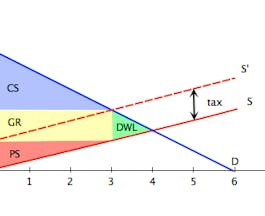Filter by
The language used throughout the course, in both instruction and assessments.
Choose the Macroeconomics Course That Aligns Best With Your Educational Goals
 Status: Free
Status: FreeYale University
Skills you'll gain: Finance, Investment Management, Risk Management, Banking, Behavioral Economics, Critical Thinking, Decision Making, Financial Analysis, Innovation, Regulations and Compliance, Leadership and Management
 Status: Free
Status: FreeUniversity of Illinois at Urbana-Champaign
Skills you'll gain: Behavioral Economics, Decision Making, Market Research, Market Analysis, Strategy, Problem Solving, Business Analysis, Econometrics, Strategy and Operations

Fundação Instituto de Administração
Skills you'll gain: Business Development, Finance, Financial Analysis, Investment Management, Strategy, Behavioral Economics, Decision Making, Financial Accounting, Market Analysis, Taxes
 Status: Free
Status: FreeErasmus University Rotterdam
Skills you'll gain: Econometrics, General Statistics, Regression

Columbia University
Skills you'll gain: Banking, Finance
 Status: Free
Status: FreeUniversity of Pennsylvania
Skills you'll gain: Problem Solving, Market Analysis, Behavioral Economics, Business Analysis, Decision Making, Finance, Market Research, Mathematics, Econometrics

University of Illinois at Urbana-Champaign
Skills you'll gain: Market Analysis, Finance, Business Analysis, Financial Analysis, Data Analysis, Behavioral Economics, Decision Making, Econometrics, Probability & Statistics, Accounting, Banking, General Statistics, Statistical Analysis, Leadership and Management, Basic Descriptive Statistics, Exploratory Data Analysis, Financial Accounting, Financial Management, Strategy and Operations, Investment Management, Market Research, Probability Distribution, Regulations and Compliance, Marketing, Risk Management, Securities Trading, Statistical Tests, Securities Sales, Strategy, Taxes, Game Theory, Regression, Microsoft Excel

University of Illinois at Urbana-Champaign
Skills you'll gain: Banking, Finance, Market Analysis, Financial Analysis, Securities Sales, Financial Management, Regulations and Compliance, Securities Trading

Erasmus University Rotterdam

Rice University
 Status: Free
Status: FreeUniversidade de São Paulo
 Status: Free
Status: FreeYale University
Skills you'll gain: Critical Thinking, Storytelling
Searches related to macroeconomics
In summary, here are 10 of our most popular macroeconomics courses
- Financial Markets: Yale University
- Microeconomics Principles: University of Illinois at Urbana-Champaign
- Macroeconomics for Business Management: Fundação Instituto de Administração
- Econometrics: Methods and Applications: Erasmus University Rotterdam
- Economics of Money and Banking: Columbia University
- Microeconomics: The Power of Markets: University of Pennsylvania
- Managerial Economics and Business Analysis: University of Illinois at Urbana-Champaign
- Central Banks and Monetary Policy: University of Illinois at Urbana-Champaign
- Introduction to Economic Theories: Erasmus University Rotterdam
- Principles of Economics: Macroeconomics - The Big Picture: Rice University










